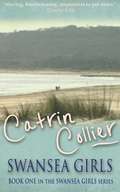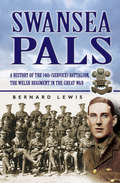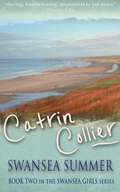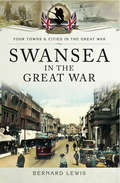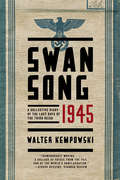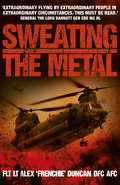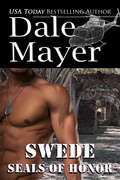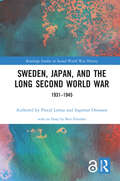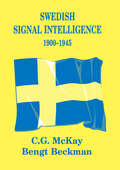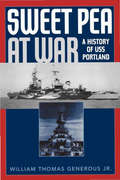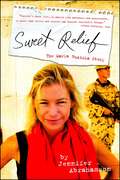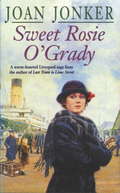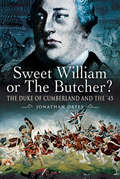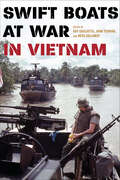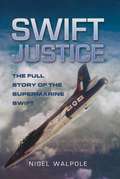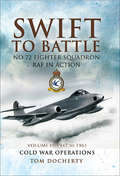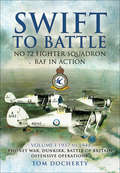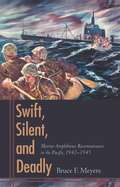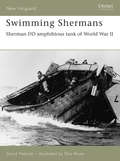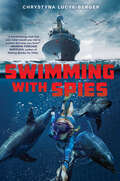- Table View
- List View
Swansea Girls
by Catrin CollierA new generation of the Maxwell family are farming at Wester Rullion during the 1980s. Young Paul Maxwell and his cousin Ryan are determined to work together to restore the farm's prosperity. How will they achieve their ambitious aims - only with the support of their grandparents? Can they overcome the hurdles of new farming regulations? Will Ryan get his heart's desire and marry Molly Nairne, daughter of a prosperous local farmer? What of Paul - abandoned by his mother as a young boy - who is adamant that he will never fall in love? Can a new arrival at the farm cause him to change his mind?
Swansea Pals: A History of the 14th (Service) Battalion, The Welsh Regiment in The Great War
by Bernard LewisThe Swansea Battalion was formed from local men by the Mayor of Swansea in the response to Lord Kitcheners famous appeal for volunteers. This, the first full history of the Battalion, covers early recruiting for the battalion in the Swansea area and its subsequent training in Swansea, Rhyl and Winchester, prior to departure, some 1,200 strong, in December 1915 for the Western Front. As part of the 38th Welsh Division it participated in the attack on Mametz Wood on the Somme where, in a single day, it suffered almost 100 men killed and 300 wounded out of an attacking contingent of less than 700. A further very successful raid on the German held High Command Redoubt was followed by front line service in the dreaded Ypres Salient. Here it took part in the bloody third Battle of Ypres, better known today as the Passchendaele Offensive. At Aveluy Wood it was accidentally shelled by its own artillery, suffering a number of fatalities. The Swansea Battalion then took an active part in the battles that finally broke the Hindenburg Line and the spirit of German resistance, one of its exploits being described as the high point of soldierly achievement by Douglas Haig. It was still advancing when the Armistice was signed in November 1918.
Swansea Summer
by Catrin CollierNewly promoted DI Matt Pryor is disappointed when his first case seems to be a simple death from natural causes - that is, until the post-mortem shows something quite unexpected ... The elderly man who died on a Cardiff train was murdered - poisoned - by one of the other passengers. But who? There's a photograph in the dead man's pocket - a photograph that matches one owned by young professional Ellie Bevan. Is it just a coincidence that Ellie's the one who stayed with the body until the police arrived - or did she have a more sinister reason for sticking around? Matt's boss DCI Martin Phelps is delving into a tricky case of his own. The new superintendent is determined to clear up any old cases with a whiff of police corruption about them and Phelps is sent to investigate the decade-old murder of a young Somali man. He soon discovers that the police reports are filled with errors. Sloppy detective work - or a cover-up? Both Pryor and Phelps soon find themselves surprisingly drawn towards investigating a respected humanitarian charity. Feted by important people, the organisation isn't quite what it seems - and a wrong move could spell disaster ... Never Dead is the fifth in Wonny Lea's Cardiff Bay Investigations featuring DCI Phelps.
Swansea in the Great War: A History Of 14th (service) Battalion, Welsh Regiment In The Great War (Your Towns & Cities in the Great War)
by Bernard LewisThe Great War left an indelible mark on almost every town and village in Britain and this extensively researched book looks in detail at how that war affected the town of Swansea and its people.Themes covered in the book include recruitment and the treatment of conscientious objectors, how Belgian refugees were cared for, and what happened to foreign nationals who were living in Swansea at the outbreak of war. How the war affected the trade of the town, especially the docks, is examined, as well as the fate of numerous Swansea ships that became targets for the German U-Boat campaign. The organisation of medical aid for wounded servicemen and the effect of food shortages, and its subsequent rationing in Swansea, are covered. The new roles performed by women and the efforts made in the town to provide support for those left at home, or serving at the front, are also examined. Away from the Home Front, the actions of both of the Swansea Victoria Cross winners are recounted, as are the stories of some of those who served on land, on sea, or in the air. These include a Swansea airman who was downed by the famous Red Baron, another who flew again after losing a leg in combat, a Swansea sailor who was lost in an encounter with a German U-Boat, the Swansea officer who twice escaped from a POW camp, and several former Swansea men who returned with Canadian, Australian or South African units to fight the common foe, with often tragic results. There are also stories of a Swansea nurse captured by the Austrians in Serbia, and a Swansea doctor at Gallipoli.Swansea in the Great War is a welcome and long overdue look at how the Great War affected the town and its people. How did the experience of war affect Swansea and the surrounding area? - From the initial enthusiasm, to the gradual realization of the enormity of human sacrifice the families of Swansea were committed to as the war stretched out over the next four years. A record of the growing disillusion of the people, their tragedies and hardships and a determination to see it through. The Great War affected everyone. At home there were wounded soldiers in military hospitals, refugees from Belgium and later on German prisoners of war. There were food and fuel shortages and disruption to schooling. The role of women changed dramatically and they undertook a variety of work undreamed of in peacetime. Extracts from contemporary letters reveal their heroism and give insights into what it was like under battle conditions, including the disastrous first day at the Somme for the Swansea Pals.
Swansong 1945: A Collective Diary of the Last Days of the Third Reich
by Shaun Whiteside Walter KempowskiA monumental work of history that captures the last days of the Third Reich as never before. Swansong 1945 chronicles the end of Nazi Germany and World War II in Europe through hundreds of letters, diaries, and autobiographical accounts covering four days that fateful spring: Hitler's birthday on April 20, American and Soviet troops meeting at the Elbe on April 25, Hitler's suicide on April 30, and finally the German surrender on May 8. Side by side, we encounter vivid, first-person accounts of civilians fleeing Berlin, ordinary German soldiers determined to fight to the bitter end, American POWs dreaming of home, concentration-camp survivors' first descriptions of their horrific experiences, as well as the intimate thoughts of figures such as Eisenhower, Churchill, Stalin, Joseph Goebbels, and Hitler himself. These firsthand accounts, painstakingly collected and organized by renowned German author Walter Kempowski, provide the raw material of history and present a panoramic view of those tumultuous days. The more than 1,000 extracts include a British soldier writing to his parents to tell them there are no baths but plenty of eggs and chocolate, an American soldier describing "the tremendous burst of lilacs" as he approaches the Elbe, Mussolini wishing Hitler a happy birthday, Eva Braun bragging to a girlfriend about what a "crack shot" she's become, and much more. An extraordinary account of suffering and survival, Swansong 1945 brings to life the end of Nazi Germany and the war in Europe.
Sweating the Metal: Flying under Fire. A Chinook Pilot's Blistering Account of Life, Death and Dust in Afghanistan
by Alex DuncanWith bullets flying, wounded soldiers scream out in pain as the Chinook comes in to land in one of the most dangerous parts of Afghanistan. At the machine's controls is one man and if he doesn't stay calm then everyone could die. That man is Flt Lt Alex 'Frenchie' Duncan DFC and he's been involved in some of the most daring and dangerous missions undertaken by the Chinook force in Afghanistan. In this book he recounts his experiences of life under fire in the dust, heat and bullets of an active war zone. At 99ft long, the Chinook is a big and valuable target to the Taliban, who will stop at nothing to bring one down. And yet Frenchie and his crew risk everything because they know that the troops on the front line are relying on them. Sweating the Metal is the true story of the raw determination and courage of men on the front line - and it's time for their story to be told.
Sweating the Metal: Flying under Fire. A Chinook Pilot's Blistering Account of Life, Death and Dust in Afghanistan
by Alex DuncanWith bullets flying, wounded soldiers scream out in pain as the Chinook comes in to land in one of the most dangerous parts of Afghanistan. At the machine's controls is one man and if he doesn't stay calm then everyone could die. That man is Flt Lt Alex 'Frenchie' Duncan DFC and he's been involved in some of the most daring and dangerous missions undertaken by the Chinook force in Afghanistan. In this book he recounts his experiences of life under fire in the dust, heat and bullets of an active war zone. At 99ft long, the Chinook is a big and valuable target to the Taliban, who will stop at nothing to bring one down. And yet Frenchie and his crew risk everything because they know that the troops on the front line are relying on them. Sweating the Metal is the true story of the raw determination and courage of men on the front line - and it's time for their story to be told.
Swede (SEALs of Honor #4)
by Dale MayerSwede watched the other SEALs fall one by one, even as murder got in the way of love… But his turn for love had yet to come. Swede hoped that he’d be lucky enough to find the perfect partner but knew it wasn’t going to happen while deep in the wilds of Mexico hunting a rebel training camp. Until a group of civilians showed up in the middle of their operation and he found out that the one person he’d known to be the wrong woman for him – was right in the middle of it. Eva had always loved animals, especially those in need. When a friend requested help moving a large group of horses from Mexico to their new homes, she jumped at it. And landed in trouble. With Swede, an old frenemy determined to extricate her. As he worked to keep her safe, she struggled to protect her heart. Only the rebels had plans of their own – and it didn’t involve a happy ending for either of them....
Sweden, Japan, and the Long Second World War: 1931-1945 (Routledge Studies in Second World War History)
by Pascal Lottaz Ingemar OttossonLottaz and Ottosson explore the intricate relationship between neutral Sweden and Imperial Japan during the latter’s 15 years of warfare in Asia and in the Pacific. While Sweden’s relationship with European Axis powers took place under the premise of existential security concerns, the case of Japan was altogether different. Japan never was a threat to Sweden, militarily or economically. Nevertheless, Stockholm maintained a close relationship with Tokyo until Japan’s surrender in 1945. This book explores the reasons for that and therefore provides a study on the rationale and the value of neutrality in the Long Second World War. Sweden, Japan, and the Long Second World War is a valuable resource for scholars of the Second World War and of the history of neutrality.
Swedish Signal Intelligence 1900-1945 (Studies in Intelligence)
by Bengt Beckman C.G. McKayA history of Swedish interception of radio and telegraph messages during World Wars I and II providing a valuable background to Swedish military operations at this time. This should prove a valuable work for anyone interested in the intelligence systems at work during wartime.
Sweet Dates in Basra: A Novel
by Jessica Jiji“In this story of love and search for identity, Jessica Jiji succeeds fully in capturing passions, depth of feeling, and strong relationships beyond ethnic and religious differences.”—Naim Kattan, author of Farewell BabylonJessica Jiji’s Sweet Dates in Basra is a compelling, poignant, and unforgettable tale of friendship and family, set in Iraq during the second world war. A dramatic departure from Jiji’s previous novel, Diamonds Take Forever, Sweet Dates in Basra brilliantly captures the atmosphere of a volatile Middle East during the previous century and pays tribute to the lost traditions of a once-idyllic world.
Sweet Devil
by Lois GreimanA thrilling, steamy novel of romantic suspense from USA Today bestselling author, Lois Greiman.Heart on the Run #2Linus Jeremy Shepherd, mercenary, ex-Ranger, and all around thrill seeker, is shocked when Carlotta Osorio arrives on the doorstep of Eddy’s Angels Detective Agency. Yes, she saved his life while he was held captive in the jungles of Colombia, but she also broke his heart by returning to the very same crime lord who’d captured him. Now he’s certain the sultry woman hopes to deliver him back into the hands of the madman who tried to kill him months ago. But whether he admits it or not, he can’t resist a damsel in distress…even if she is planning to get him killed.Carlotta Elaina Padilla-Osorio is terrified. Her sister Sofia is missing, and although Lotta has vowed never to demean herself by seeking Shep, who she believes abandoned her without a backward glance, circumstances demand that she swallow her pride to save Sofia. Will they find her before it’s too late or will the mistakes of their past destroy them?''Lois Greiman delivers.'' –Christina Dodd, New York Times bestselling author“Dangerously funny stuff!” –Janet Evanovich"Lois Greiman is a modern day Dorothy Sayers. Witty as hell, yet talented enough to write like an angel with a broken wing." –Kinky Friedman, author of Ten Little New Yorkers"Lois Greiman is a natural storyteller." –#1 New York Times bestseller, Victoria Alexander
Sweet Home Alaska (A Wild Coast Novel #1)
by Jennifer Snow"Never too late to join the growing ranks of Jennifer Snow fans."—Fresh FictionWhen old feelings resurface, will the truth bring them back together?Skylar Beaumont never wanted to return to Alaska. Still, when duty calls, she can&’t refuse. And, as a third-generation &“Coastie&” and the only female captain in the local coast guard, she has too much to prove. Being stationed in her hometown of Port Serenity isn&’t ideal—but she&’ll tough it out until her transfer goes through and she can move on to warmer waters. That&’s the plan, at least, until she crashes into Dex Wakefield. Again.Shocked to see his secret high school sweetheart after all this time, Dex can&’t help but wonder if he should finally come clean. Skylar deserves to know the real reason why he abandoned the dream they&’d shared—and broke her heart. But this small tourist town is home to one big grudge where their families are concerned… And leaving the past behind might be the only way Dex and Skylar will finally realize that their first love deserves a sweet second chance. Bonus NovellaIn Jennifer Snow&’s Love on the Coast, Rachel Hempshaw embarks on a themed cruise, aiming to dispel yet another local legend. But when her ship is caught up in a coast guard operation, one sexy officer makes it his mission to prove the existence of something that Rachel no longer believes in—real love.A Wild Coast Novel
Sweet Pea at War: A History of USS Portland
by William Thomas Generous Jr.This WWII naval history chronicles the prolific combat career of one of the most important US ships to fight in the Pacific War. Few ships in American history have had as illustrious a history as the heavy cruiser USS Portland (CA-33), affectionately known by her crew as 'Sweet Pea.' With the destruction of most of the US battleship fleet at Pearl Harbor, cruisers such as Sweet Pea carried the biggest guns the Navy possessed for nearly a year after the start of World War II. Sweet Pea at War describes in harrowing detail how Portland and her sisters protected the precious carriers and held the line against overwhelming Japanese naval strength. Portland was instrumental in the American victories at the Battle of the Coral Sea, the Battle of Midway, and the naval battle of Guadalcanal—conflicts that historians regard as turning points in the Pacific war. She rescued nearly three thousand sailors from sunken ships, some of them while she herself was badly damaged. Only a colossal hurricane ended her career, but she sailed home from that, too. Based on extensive research and interviews with members of the ship's crew, Sweet Pea at War recounts from launching to scrapping the history of USS Portland, demonstrating that she deserves to be remembered as one of the most important ships in US naval history.
Sweet Relief: The Marla Ruzicka Story
by Jennifer AbrahamsonMarla Ruzicka was a free spirit, a savvy political operator, a wartime Erin Brockovich. Fiercely determined to improve the lives of the less fortunate, the twenty-something blonde was instrumental in convincing the U.S. government to pass historic legislation aiding civilian victims of war. Sweet Relief recounts Marla's journey from an idyllic childhood in a small California town, through Latin America and Africa, and finally to the war zones in Afghanistan and Iraq. Whether she was Rollerblading the halls of Congress to secure funds for civilians in Iraq or throwing parties for journalists in Kabul to raise awareness of her cause, no one who came within a hundred yards of Marla missed her. Her friendly smile and indefatigable pose were ubiquitous in Afghanistan and Iraq where Marla managed a door-to-door effort to identify war victims. While Marla worked tirelessly to care for others, in many ways she neglected herself. A diagnosed manic-depressive, Marla battled extreme emotional lows and an eating disorder. And although she brought love into the homes of the aggrieved, she often struggled to find a love of her own. Marla gave the invisible victims of war a voice and, in the process, helped to win them millions of dollars in unprecedented aid. Tragically, Marla was killed by a suicide bomber on Airport Road in Iraq in April 2005. Weeks later, the U.S. government named the program she fought so hard to establish The Marla Ruzicka Fund. Her life and legacy are an inspiring reminder that love and determination can conquer all.
Sweet Rosie O'Grady: A touching wartime saga that promises both laughter and tears (Molly and Nellie series, Book 3)
by Joan JonkerThe war creates new demands for Molly and Nellie's families, as well as a few surprises. In Sweet Rosie O'Grady, Joan Jonker brings us another instalment of her hugely popular Molly and Nellie series, as the two friends get up to more mischief in their beloved Liverpool. Perfect for fans of Katie Flynn and Nadine Dorries.Neighbours Molly Bennett and Nellie McDonough are thrilled to see their children settling down. Jill and Steve are making wedding plans and Doreen waits patiently at home for Phil's next leave. But the Second World War is separating loved ones forever and the future looks bleak... Then Rosie O'Grady arrives in Liverpool from Ireland and Molly and Nellie are in for a treat. With her sparkling blue eyes and youthful charm, sweet Rosie O'Grady is like a breath of fresh air. Her direct approach to life soon has everyone crying with laughter; and Molly's son, Tommy, who used to think girls were nothing but a nuisance, is in for a pleasant surprise... What readers are saying about Sweet Rosie O'Grady: 'Carrying on the saga of Molly and Nellie, two extremely funny and big-hearted ladies, this book will not disappoint Joan fans anywhere!... Oh, and fans of Nellie will love all of the tricks that she gets up to in this book!''Another great read from Joan Jonker. Her books contain a little bit of everything, sadness and humour in vast quantities, she certainly knew how to put a smile on the reader's face. FABULOUS READ'
Sweet William or the Butcher?: The Duke of Cumberland and the '45
by Jonathan Oates'Butcher' Cumberland is portrayed as one of the arch villains of British history. His leading role in the bloody defeat of the Jacobite rebellion in 1745 and his ruthless pursuit of Bonnie Prince Charlie's fugitive supporters across the Scottish Highlands has generated a reputation for severity that has endured to the present day. He has even been proposed as the most evil Briton of the eighteenth century. But was Prince William Augustus, Duke of Cumberland, the younger son of George II, really the ogre of popular imagination? Jonathan Oates, in this perceptive investigation of the man and his notorious career, seeks to answer this question. He looks dispassionately at Cumberland's character and at his record as a soldier, in particular at this behavior towards enemy wounded and prisoners. He analyses the rules of war as they were understood and applied in the eighteenth century. And he watches Cumberland closely through the entire course of the '45 campaign, from the retreat of the rebels across northern England to the Highlands, through Battle of Culloden and on into the bloodstained suppression that followed.
Swift Arrow: An Historical Novel Based on the Sioux Indian Uprising
by Alice PrendergastHere is a dramatic narrative with its setting in southern Minnesota and based upon the period before and during the Indian resurrection. Written in a stirring and compelling manner by an author who spent several years in exhaustive research of all historical facts involved in this period of Minnesota history, she has combined a fictional story against a background of actuality. In southern Minnesota and in Iowa, the name of Little Crow still spells misery and desolation. Five Little Crows ruled the great tribe of Sioux Indians. A Little Crow made the Treaty of Traverse des Sioux. Then a fifth little Crow struck the whites at Fort Ridgely in 1858. Joe Walker, who is a real character in Swift Arrow, was a captain in the Minnesota Rangers and did yeoman service until General Sibley's troops arrived to check the Indians. Pierre Leduc, the hero of Swift Arrow, fights in the war. His wife had been one of the five captives captured by the Indians; their love story is an epic of tenderness and devotion. The reader will love Betsy as Pierre did, and admire her greatness of soul. Joe and Katie Walker are still remembered by many farmers of the Minnesota Valley whose relatives were slain in the massacre.
Swift Boats at War in Vietnam
by Guy Gugliotta;John Yeoman;and Neva SullawayIn this oral history, Vietnam veterans recount their stories of patrol and combat on the coast and in the Mekong Delta. Developed specifically for the Vietnam War, Swift Boats were versatile craft &“big enough to outrun anything they couldn&’t outfight&” but too small to handle even a moderate ocean chop, too loud to sneak up on anyone, and too flimsy to withstand the mildest of rocket attacks. This added challenges to an already tough mission: navigating coastal waters for ships and sampans smuggling contraband to the Viet Cong, disrupting enemy supply lines on the rivers and canals of the Mekong Delta, and inserting SEALs behind enemy lines. The stories in this book cover the Swift Boats&’ early years, which saw search-and-inspect operations in Vietnam&’s coastal waters, and their later years, when the Swift Boats' mission shifted to the Mekong Delta&’s labyrinth of three-thousand miles of rivers, streams, and canals. This is an intimate, exciting oral history of Swift Boats at war in Vietnam.
Swift Justice: The Full Story of the Supermarine Swift (Aviation Ser.)
by Nigel WalpoleThe Supermarine Swift was rushed into service with the RAF during 1954 to become Britain's first second-generation jet fighter. In this role it was not deemed a success and has been burdened with a bad reputation since that time. It was eventually replaced by the famous Hawker Hunter that had been extensively delayed because of teething troubles. This book covers the development and operational history of a vital aircraft that is a part of aviation legend.
Swift to Battle: Cold War Operations
by Tom DochertyThis third of three volumes traces the history of 72 Fighter Squadron, one of the premier squadrons in the Royal Air Force. The aircraft flown, operational personnel and missions flown are fully described with first-hand accounts from pilots and both air and ground crew. Having seen active service in the war years this volume covers the period 1947 to 1961 when the squadron was disbanded. During this period the squadron moved into the jet age at first flying de Havilland Vampires and then the Gloster Meteor F8s in 1952 and finally the Gloster Javalin in 1959 until the squadron was disbanded at Leconfield in June 1961.
Swift to Battle: Phoney War, Dunkirk, Battle of Britain, Offensive Operations
by Tom DochertyThis first of three volumes traces the history of 72 Fighter Squadron, one of the premier squadrons in the Royal Air Force. The aircraft flown, operational personnel and missions flown are fully described with firsthand accounts from pilots and both air and ground crew.Having been first established in 1917 the squadron was disbanded in February 1918. It was re-formed in February 1937 from B Flight of 1 Squadron and was equipped with Gloster Gladiators. In 1939 it was re-equipped with Spitfires which were used in air defense and convoy protection sorties following the start of the war. In 1940 the squadron moved to assist in the evacuation of Dunkirk. During The Battle of Britain, 72 spent the early days at RAF Acklington as part of 13 Group before moving south during September to assist the main defense force. The squadron then flew penetration Circus missions over occupied Europe with the intention of causing havoc to the German forces and also to lure German fighters into combat.
Swift, Silent, and Deadly
by Bruce MeyersAn experienced reconnaissance Marine officer, Bruce Meyers paints a colorful and accurate picture of the special recon landings that preceded every major amphibious operation in the Pacific War. Credited with saving countless lives, these Marine scouts went in stealthily at night from submarines, PT boats, Catalinas, and high-speed transports. Swift, silent, and deadly, they landed on more than two hundred enemy beaches, from Tarawa to Guadalcanal, Iwo Jima, and Okinawa to collect intelligence on potential landing sites. They measured water depths, charted coral heads, gathered soil samples, sought out enemy locations, and took photographs. In short, they obtained information vital to the success of American operations in the Pacific.This book represents the first time World War II Marine recon landings have been chronicled. Meyers explains that only the story of their contributions in later wars has been previously documented. His book describes the start of it all, letting readers join the men as they slip over the sides of their rubber boats and make their way inland. Only now can the public appreciate the accomplishments of these daring and intrepid Marines.
Swimming Shermans
by Tony Bryan David FletcherThe Sherman DD (Duplex Drive) tank was designed by the Allies specifically for the D-Day landings; enveloped in a waterproofed canvas screen, the tank was launched at sea from landing craft and then 'swam' slowly to shore, where the screens were deflated, allowing the tanks to operate as fighting vehicles. Exploring the development and modifications of the Sherman DD, this book discusses its many variants, including the prototype Valentine DD tank and its role as a training tank in Britain and limited operational use in Italy, and examines the successes and tragic failures on the beaches of Normandy and further into North-West Europe, including the challenge of crossing the River Rhine.
Swimming with Spies
by Chrystyna Lucyk-BergerAs war escalates between the Russians and Ukrainians in the port city of Sevastopol, can one girl and a pod of dolphins prove that communication is the greatest weapon of all? It’s February of 2014 in the seaport city of Sevastopol in Crimea. Sofiya Oleksandrivna only wants two things: to figure out a way to get Ilya Ilyich to stop bullying her, and to convince her mother to come back home. But as battleships come to populate the waters around their city and Russian forces, including Ilya’s father, start to make their presence known, an even greater threat takes over Sofiya’s life.The only escape Sofiya has is the dolphinarium where her father is a trainer at the forefront of teaching sign language to a pod of dolphins. And now the Russian military has ordered the dolphinarium to hand over its animals for military use. As armed Russian troops invade Crimea and conflict and tension continue to rise, Sofiya will do everything she can to keep her pod safe. And what she knows better than any of the soldiers occupying her city, is that the most powerful force is communication.Based on the true events of the 2014 annexation of Crimea, Chrystyna Lucyk-Berger depicts a familiar world where divisions are sown by hate, but where love can make a world of difference.
